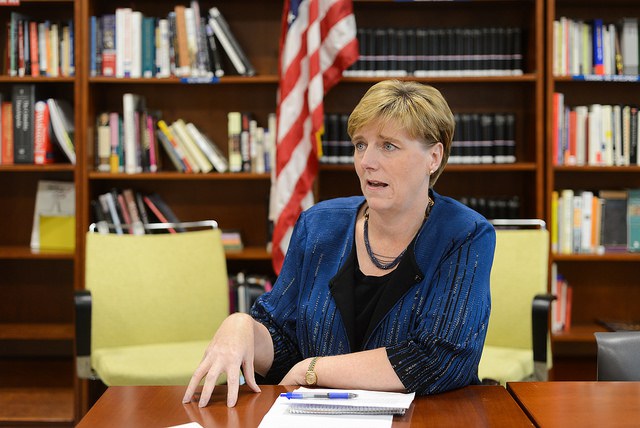22 de junio 2016

The Return of the Military

PUBLICIDAD 1M
PUBLICIDAD 4D
PUBLICIDAD 5D
The American diplomat talks about customs, property rights, lack of rule of law, and the Nicaraguan elections

Laura Dogu, ambassador of the United States in Nicaragua. Photo: Carlos Herrera.
US ambassador Laura Dogu has a thermometer to measure the business climate in the country: queries made to her by foreign investors. Although she notes that regarding political issues and particularly the November 6 elections, "They need not talk to me, it’s enough to listen to the voices of Nicaragua."
To the existing problems facing investors on property rights, customs, and the lack of the rule of law, is now added the deterioration of the credibility of the upcoming elections, she explained. According to Nicaraguans, the vote will not be clean, transparent or competitive, as the government has shut the doors to the opposition.
Two weeks ago President Ortega decreed a virtual ban on national and international electoral observation. The Carter Center called it an "attack on the international community". How does your government assess the cancellation of election observation?
It's important to us that any government listens to the voices of its citizens. It's a pity that the government of Nicaragua decided not to listen to the voices that are calling for electoral observation here in Nicaragua - voices of the church, private sector, civil society, and the voices of many citizens you can hear on the radio, on television, in several magazines. It is important for any government to listen to the people. It's important to have an election that will be recognized as a free, transparent and fair.
Many believe that without electoral observation the credibility of the electoral process is affected? How do you see it?
I think that observation is a very important part of any electoral process in any country since it can give credibility to the process. We have just seen a very interesting election in Peru which ended with nearly fifty percent for each of the two candidates. However, with international observers, the two candidates could trust that the results were fair and transparent, and the people of Peru as well. Therefore the very close results were accepted by both sides without problems, which is a normal part of an electoral process in many countries, and I think it should be part of an electoral process here in Nicaragua as well.
The private sector, church and political and civil society in Nicaragua have reacted with concern to a resolution of the Constitutional Chamber of the Supreme Court which negated the right of an opposition coalition to use the name and seal of the Liberal Independent Party (PLI). This move effectively closed the electoral doors to them and ensured that this election will not be competitive. Will this affect the legitimacy of the electoral process?
It’s not for the government of the United States to comment on a legal process here in Nicaragua, that's for Nicaraguan experts.
Obviously if there is doubt in the eyes of Nicaraguans, doubts in the private sector, by the church, doubts on the part of civil society in this process, there's a problem. It’s a problem because if they don't have confidence in the results and the process, they won't accept the results. And as we have seen, they're not going to participate in the process, and that will bring questions about the credibility of the elections. But it's for Nicaraguans to decide that.
The private sector has said that the loss of credibility of the elections may have an impact on the stability of the country, and especially on the business climate in the medium term. Have you noticed any reaction or concern from US investors?
Yes. We are in touch with several people, not just focused on this, but I'm hearing three things mainly from investors who are thinking of investing here. First, the topic of customs: many companies have problems with customs. Second, the rule of law here in Nicaragua, or lack of rule of law in their view; and third, the situation with property here in Nicaragua.
This situation with the elections, as well as the expulsions of our people, has shone a strong light on this subject. They were already focused on customs, the issue of inspections, the ability to export from Nicaragua to the United States. They are also obviously talking about the political situation here. They can read and listen to the voices here in Nicaragua, they don’t necessarily need to talk to me. So there are questions in all three areas, and they are bigger now than before and there is a concern.
I do not know what impact this will have because companies will decide what they want to do. But now there are more questions, I think, in this process, and it's not good for the economic situation here. When companies have doubts, it's not good for any economy.
This article has been translated from Spanish by Havana Times.
Read the original version of the article here.
Archivado como:
PUBLICIDAD 3M
Periodista nicaragüense, exiliado en Costa Rica. Fundador y director de Confidencial y Esta Semana. Miembro del Consejo Rector de la Fundación Gabo. Ha sido Knight Fellow en la Universidad de Stanford (1997-1998) y profesor visitante en la Maestría de Periodismo de la Universidad de Berkeley, California (1998-1999). En mayo 2009, obtuvo el Premio a la Libertad de Expresión en Iberoamérica, de Casa América Cataluña (España). En octubre de 2010 recibió el Premio Maria Moors Cabot de la Escuela de Periodismo de la Universidad de Columbia en Nueva York. En 2021 obtuvo el Premio Ortega y Gasset por su trayectoria periodística.
PUBLICIDAD 3D